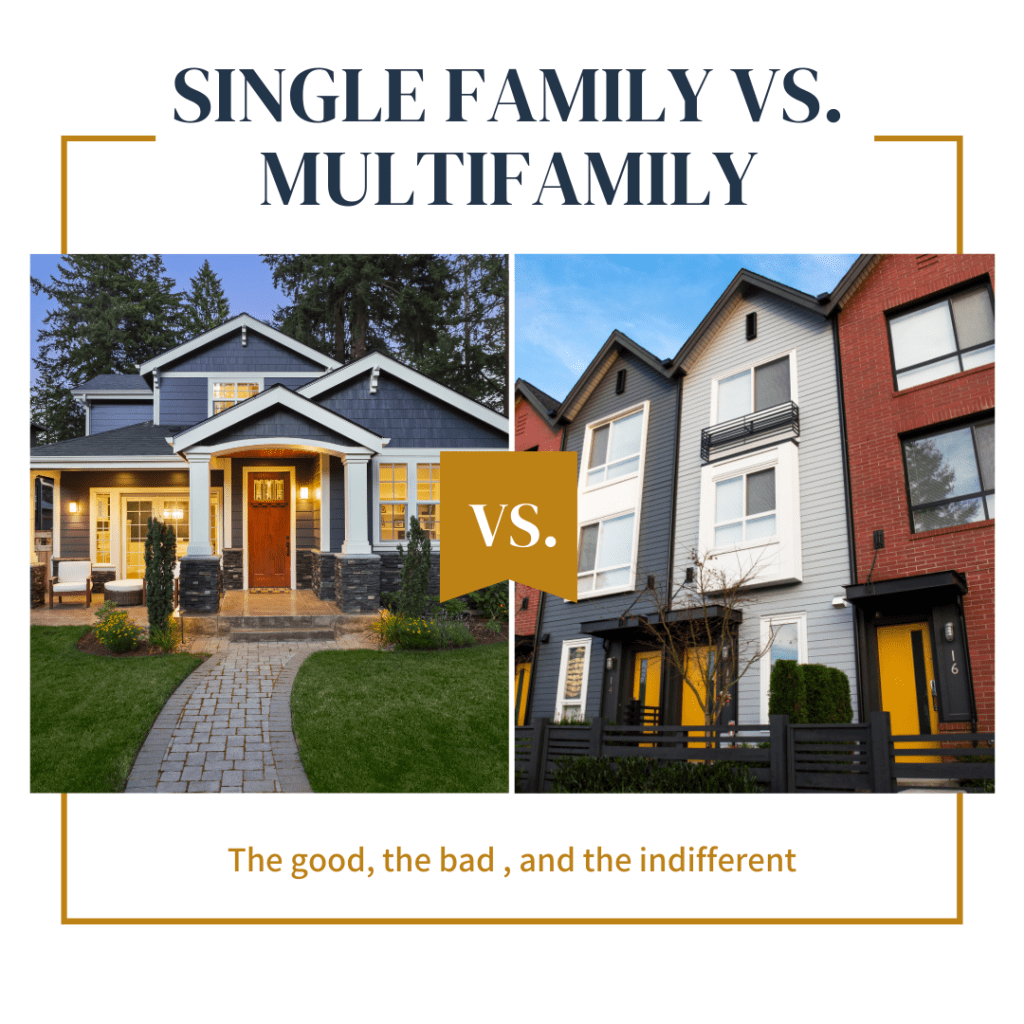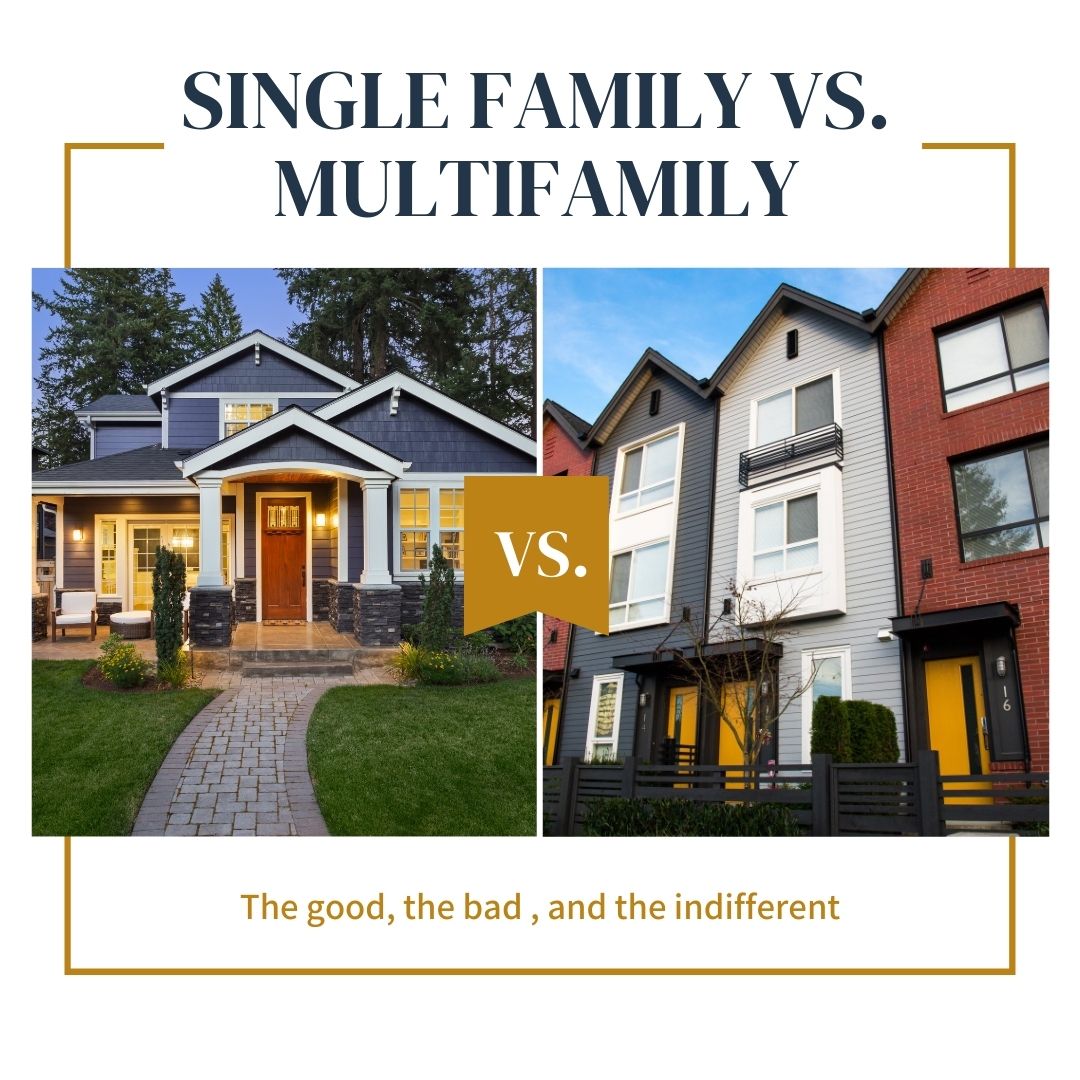

By Corey Cabrera
Real estate investing is one of the best ways to increase your wealth and create passive income. If you’re starting out in the world of real estate investing, the most logical strategy is to invest in is single-family or multifamily properties. Each product type has its own advantages and disadvantages, and ultimately the answer depends on your goals and desired time commitment.
Assuming your goal is to hold these properties long-term and rent them to a tenant, let’s take a look at each property type to help you decide which real estate investment would be best for you.
Single-Family Homes
Going this route is the more popular choice with new real estate investors. But there are still some things you should consider before jumping into life as a landlord. They include:
Pros:
- Easier To Get Started: There is far more single-family home than there are multi-family inventory, and this means you will have an easier time finding something within a price range you are comfortable paying. You’ll also need less money to get started since you may be able to obtain financing with low-interest rates and down payments as low as 15%.
- Better Resale: Single-family homes tend to appreciate in value more quickly than multifamily homes do. This is due to there being more demand for single-family homes than there is for multifamily units. (keep in mind, single-family and multifamily homes are valued differently. More on that later).
- Affordable Property Taxes: Comparatively to a multifamily or commercial property. The tax rate of your single-family investment property will be proportionally lower.
- Lower Costs To Manage: More common than not, the tenant demographic that will be occupying your single-family home is going to be a family who will likely take better care of your property.
- Tenant Duration: Speaking of tenants, tenants occupying a single-family home tend to stay for longer durations. On average, that tenancy is 3 years (Source).
Cons:
- Vacancy: If you don’t have a tenant, you bring in zero income and will have to cover the mortgage and other expenses yourself. For someone starting off, this can be painful if the unit is not occupied quickly.
- Lower ROI: Home values have increased upwards of 17% in some parts of the Portland Metro area (Source). Meaning, if you do buy a single-family home right now, you are paying retail pricing. Rental rates, on the other hand, have increased but not by nearly as much (maximum of 9.9% in 2022). This means that you might not have as much money left over after you cover your portion of the expenses like the mortgage, property taxes, and insurance.
- HOA Fees & Restrictions: This can be a double-edged sword for a landlord who owns a property that is in a neighborhood with an HOA. You want to assure that your home and the surrounding homes are held to a standard that keeps the aesthetic integrity of the neighborhood cohesive so that your investment can maximize its value, but some HOA’s that hold such high standards also enforce an HOA cap for renters.
- Scalability: The rate at which you can scale your rental portfolio can be at a slower rate than multifamily. Because you are relying on one single source of rental income, it can be challenging to make it pencil to pull equity from this investment to roll into the next. You may have to wait longer or even come up with more capital to purchase your next investment property. Furthermore, conventional mortgage guidelines allow a maximum of up to 10 financial properties. This includes your primary residence.
- You Are Paying Retail: Even though, there are more single-family homes compared to multifamily, the competition seeking the very same homes exist. Be prepared to pay the list price or above to secure your deal. Especially in today’s market.
Multifamily
Within the multifamily umbrella, you have a lot of choices. Multifamily homes include duplexes and triplexes up to large apartment buildings. In this case, we let’s keep it simple for now and assume anything from a duplex to a 4-plex. Here are some factors you may want to consider before investing in a multifamily property:
Pros:
- More Tenants Means More Cash Flow: In many cases, the price difference between a single-family home and a multifamily home is not very much, so you’ll have more money to cover all of your expenses which means you’ll also have more money in your pocket. Let’s say you have a tri-plex, and each unit rents for $1100 per month. When all three are rented out, that’s $3300 per month you are bringing in to cover your share of the costs.
- Lower Property Management Fees: You’ll likely be able to get a better deal with a property manager when they are managing multiple units for you, but this will be an added expense that you would need to include in your projections (assume 8-10% of gross rental income per month).
- Scalability Trajectory: Buying multifamily property is a lot less complicated than investing in other types of asset classes such as office space, retail, hotels, industrial. Ultimately, multifamily is a great way to scale at a faster rate if this is the trajectory you desire.
- Tax Benefits: Most investors use a mortgage to finance the property. Tax breaks can include the option to deduct your mortgage interest or write-off property taxes. You may also be eligible to deduct expenses related to the units that can include but are not limited to; maintenance, upgrades, and deprecation can then take a deduction for mortgage interest paid during that fiscal year. Depreciation can be used to offset a significant portion of the rental income collected each year.
- Lowered Risk: Investing in a Multifamily property is considered a relatively safe investment compared to other asset classes. Ultimately, people need somewhere to live and during an economic downturn, in some cases, people find themselves selling their homes and renting.
Cons:
- More Difficult To Sell: The demand for multifamily homes is not as high as it is for single-family homes, so if you were put in a position where you needed to sell the property quickly, it might be challenging to do so. Especially if there are vacancies or delinquent tenants.
- Property Management Immunity: Although property management can be outsourced, that does not mean that managing the property is going to be hands-off out of the gate. Especially if you are starting off. You are still going to have some level of responsibility for dealing with individual leases, tenant requests, move-in/move-out, and repairs. If you have hired a decent property management company, some of the burdens can be alleviated, but you are not immune.
- Higher Capital Expenditures: Expenses are going to be a lot higher compared to a single-family rental property. And that cost will increase with the number of units you have. In all cases, you should set aside a capital expenditure budget, but in the case you would need to replace HVAC units or a roof, you may not have enough in your reserve. Having a line of credit or additional funds available is never a bad idea.
Keep in mind before taking the plunge and buying an investment, make sure you are familiar with the local real estate market conditions. Ultimately, these tried-and-true strategies on how to build wealth and a passive income stream into perpetuity. If you need an expert on your side to help you through the process, we are here to help.

Corey Cabrera
Corey is the Principal Broker of Freehold Group in the state of Oregon. He has earned a B.S. in Architecture from Portland State University, as well as a Master in Real Estate Development (MRED) from Portland State University’s School of Business.

